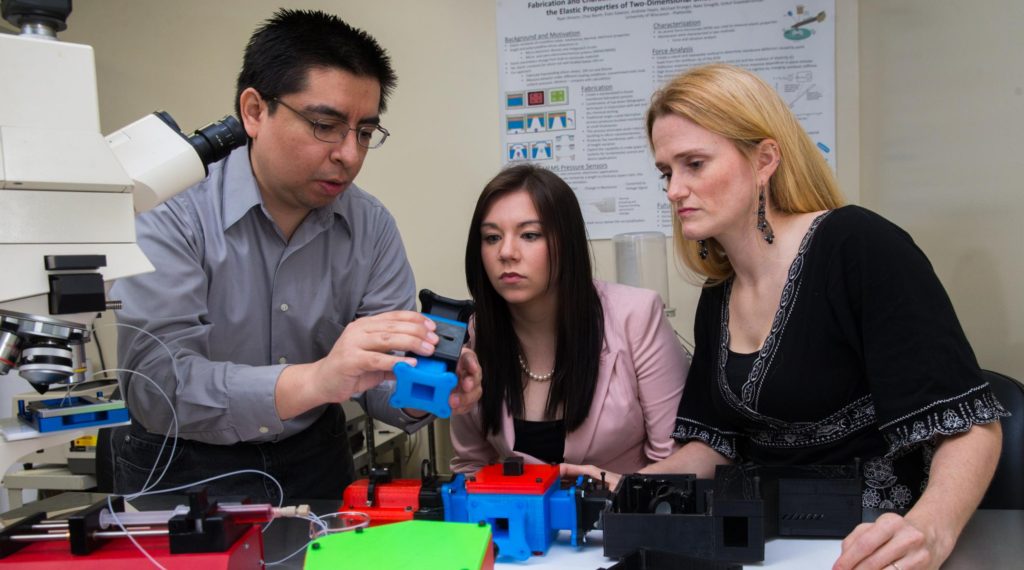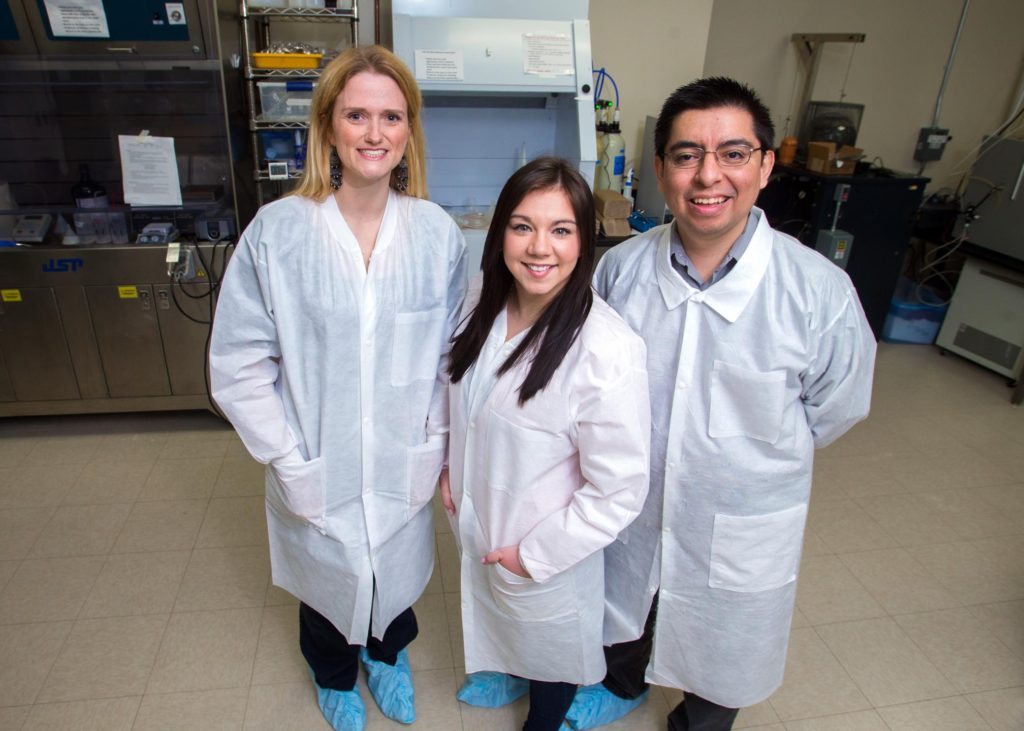
(from left) Dr. Jorge Camacho, Jessica Symons, and Dr. Miranda Bader-Goodman collaborate on cancer research at UW-Platteville.
PLATTEVILLE, Wis. – Eight University of Wisconsin-Platteville students are collaborating on a research project that investigates how cesium compound works in treating and fighting cancers. The students presented their project at the Research in the Rotunda event at the capitol in Madison, Wisconsin, on April 12.
According to Jessica Symons, senior engineering physics major and lead student researcher, cesium is a novel therapeutic hypothesized to target and kill cancer cells by inducing a pH change in the individual cell. “Many methods used to treat cancer can be very harmful to the healthy parts of the body. In previous studies, using cesium as a therapeutic has been shown to target cancer while causing little to no side effects. This research may help us understand how cesium destroys cancer at the cellular level,” said Symons.
Drawing from methods and processes used in various disciplines, the student researchers have used their understanding of engineering and science to develop technology that has the potential to be patented and used in industry. By integrating both a microfluidic device that entraps single cells and measures extracellular pH, and a specialized Raman spectroscope that analyzes chemical changes occurring within the cell, students are able to examine the biochemical response at multiple levels. Under the direction of Dr. Jorge Camacho, assistant professor of mechanical engineering at UW-Platteville, students built their own spectroscope and microfluidic device from scratch.
“Employers want independent thinkers and do-ers, those who can apply their knowledge and have a fundamental capacity to troubleshoot. While the classroom builds the foundations, hands-on research experience puts these concepts into practice in ways most students never even consider.”
–Dr. Miranda Bader-Goodman
The multidisciplinary nature of the research has allowed students to gain a broad range of experience in biology, electrical engineering, engineering physics and mechanical engineering, while learning how to interact and collaborate with others effectively. Students contributing to the research include biology majors John Dank from Hillsboro, Wisconsin, Carley Traverse from Maquoketa, Iowa and Katie Schulteis from Kewaskum, Wisconsin; engineering physics majors Jessica Symons from Benton, Wisconsin, Bryan Reyes from Chicago, Illinois, Bridget White from Prairie du Chien, Wisconsin and Nicole Maala from Valders, Wisconsin; and mechanical engineering major Kolt Bode from Baraboo, Wisconsin.
“Employers want independent thinkers and do-ers, those who can apply their knowledge and have a fundamental capacity to troubleshoot,” said Dr. Miranda Bader-Goodman, assistant scientist at UW-Platteville and advisor of the project. “While the classroom builds the foundations, hands-on research experience puts these concepts into practice in ways most students never even consider.”
According to Symons, utilizing different perspectives and ideas has allowed the group members to make significant strides in their research. And, with each student leading or co-leading a part of the project, students have cultivated professional skills that will be useful throughout their undergraduate career and beyond.

(from left) Dr. Miranda Bader-Goodman, Jessica Symons, and Dr. Jorge Camacho are leading a team of cancer researchers at UW-Platteville.
The group is currently testing the microfluidic device, designing software and the physical alignment of the Raman, culturing cells, and testing cesium toxicity. They hope to test the cells in the microfluidic device by the end of the semester and begin working with Raman this summer.
Looking forward, if cesium is shown to be effective, it could lead to a low-cost alternative cancer treatment that is free from toxic side effects, ultimately improving the quality of life for cancer patients and survivors.
Written by: Laura Janisch, UW-Platteville Communications, 608.342.1194, janischla@uwplatt.edu

